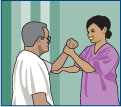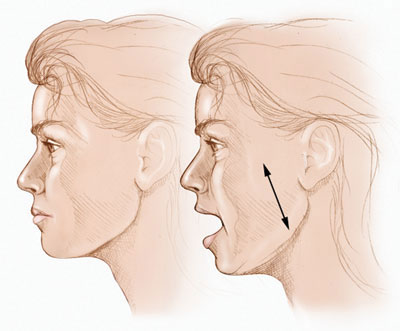|
Late Radiation Therapy Side Effects
Brain Changes
Infertility
Joint Changes
Lymphedema
Mouth Changes
Secondary Cancer
Late side effects are those that first occur at least 6 months after radiation therapy is over.
Late side effects are rare, but they do happen. It is important to have follow-up care with
a radiation oncologist or nurse practitioner for the rest of your life.
Whether you get late side effects will depend on:
- The part of your body that was treated
- The dose and length of your radiation therapy
- If you received chemotherapy before, during, or after radiation therapy
Your doctor or nurse will talk with you about late side effects and discuss ways to help
prevent them, symptoms to look for, and how to treat them if they occur.
Some late side effects are brain problems, infertility, joint problems, lymphedema, mouth
problems, and secondary cancers.
What they are
Radiation therapy to the brain can cause problems months or years after treatment ends.
Side effects can include memory loss, problems doing math, movement problems,
incontinence, trouble thinking, or personality changes. Sometimes, dead tumor cells can
form a mass in the brain, which is called radiation necrosis.
Ways to manage
You will need to have check-ups with your doctor or nurse for the rest of your life. If you
have symptoms, you will have tests to see whether they are due to the cancer or late side
effects.
If you have late side effects, your doctor or nurse practitioner:
- Will talk with you about ways to manage late side effects
- May refer you to a physical, occupational, or speech therapist who can help with problems caused by late side effects
- May prescribe medicine or suggest surgery to help with the symptoms
What it is
For men, infertility means not being able to get a woman pregnant. For women, it means
not being able to get pregnant.
Ways men with infertility can become a parent:
- Donor sperm. This means getting a woman pregnant with sperm given by another man.
-
 Adoption. Taking on legal responsibility for someone else's child and raising the child as your own.
Adoption. Taking on legal responsibility for someone else's child and raising the child as your own.
Ways women with infertility can become a parent:
- Donor embryos. Another couple donates a fertilized egg that your
doctor implants in your uterus to carry until birth.
- Donor eggs. An egg (donated by someone else) is fertilized by your partner's sperm.
Your doctor implants the fertilized egg in your uterus to carry until birth.
- Surrogacy. Another woman carries and gives birth to your child. She can also donate
her egg, which is fertilized by your partner's sperm.
- Adoption. Taking on legal responsibility for someone else's child and raising the child
as your own.
What they are
Radiation therapy can cause scar tissue and weakness in the part of the body that was
treated. This can lead to loss of motion in your joints, such as your jaw, shoulders, or hips.
Joint problems can show up months or years after radiation therapy is over.
 Ways to manage
Ways to manage
Notice early signs of joint problems. These signs include:
- Trouble getting your mouth to open wide
- Pain when you make certain movements, such as reaching over your head or putting your hand in a back pocket
Talk with your doctor or nurse. He or she may refer you to a
physical therapist who will assess your joint problems. The therapist can give you exercises
to decrease pain, increase strength, and improve movement.
What it is
 Swelling in an arm or a leg caused by a build up of lymph fluid. Lymphedema can happen
if your lymph nodes were removed during surgery or damaged by radiation therapy.
Tell your doctor or nurse if you notice swelling in the arm or leg
on the side where you had radiation.
Swelling in an arm or a leg caused by a build up of lymph fluid. Lymphedema can happen
if your lymph nodes were removed during surgery or damaged by radiation therapy.
Tell your doctor or nurse if you notice swelling in the arm or leg
on the side where you had radiation.
Ways to manage
- Meet with your doctor or nurse. Ask about your risk of
lymphedema and ways to prevent it. Your doctor or nurse
may suggest exercises, medicines, or compression garments (special wraps to put on
your legs or arms). You might also want to ask for a referral to a
physical therapist.
-
 Be active. Exercise can help prevent and treat lymphedema. Ask your
doctor, nurse, or physical therapist which exercises are safe for you to do.
Be active. Exercise can help prevent and treat lymphedema. Ask your
doctor, nurse, or physical therapist which exercises are safe for you to do.
- Take care of your arm or leg.
- Use skin lotion at least once a day.
- Avoid sunburn. Use sunscreen with an SPF of 30 or higher and wear long sleeves and long pants if you need to be in the sun.
- Wear gloves when you garden or cook.
- Clip your toenails straight across, file your fingernails, and do not cut your cuticles.
- Keep your feet clean and wear dry, cotton socks.
- Clean cuts with soap and water and then use antibacterial ointment.
- Avoid extreme hot or cold, such as ice packs or heating pads.
- Do not put pressure on your arm or leg. For example, do not cross your legs when sitting or carry your purse on the side that had radiation.
- Wear loose clothes that do not have tight elastic cuffs or waistbands.
- Notice early signs of lymphedema. Let your doctor or nurse know if you have:
- Pain or a sense of heaviness in your arm or leg
- A feeling of tightness in your arm or leg
- Trouble putting on your shoes or rings
- Weakness in your arm or leg
- Redness, swelling, or other signs of infection
What they are
Radiation therapy to your head and neck can cause late side effects in your mouth.
Problems may include dry mouth, cavities, or bone loss in the jaw.

Exercise your jaw 3 times a day.
|
Ways to manage
- Visit your dentist. You may be asked to have
your teeth checked every 1 to 2 months for at
least 6 months after radiation treatment
ends. During this time, your dentist will look
for changes in your mouth, teeth, and jaw.
- Exercise your jaw. Open and close your
mouth 20 times as far as you can without
causing pain. Do this exercise 3 times a day,
even if your jaw isn't stiff.
-
Take good care of your teeth and gums.
This means flossing, using daily fluoride treatments, and
brushing your teeth after meals and before you go to bed.
-
 Have your dentist contact your radiation oncologist before you
have dental or gum surgery. This includes not having teeth
pulled from the part of your mouth that received radiation.
There may be other options than surgery.
Have your dentist contact your radiation oncologist before you
have dental or gum surgery. This includes not having teeth
pulled from the part of your mouth that received radiation.
There may be other options than surgery.
What it is
Radiation therapy can cause a new cancer many years after you have finished treatment.
This does not happen very often.
Ways to manage
You will need to have check-ups with your radiation oncologist or nurse practitioner for
the rest of your life to check for cancer - the one you were treated for and any new cancer
that may occur.
See "Resources for Learning More" for ways to learn more about late
side effects.
Back to Top
< Previous Section | Next Section > |